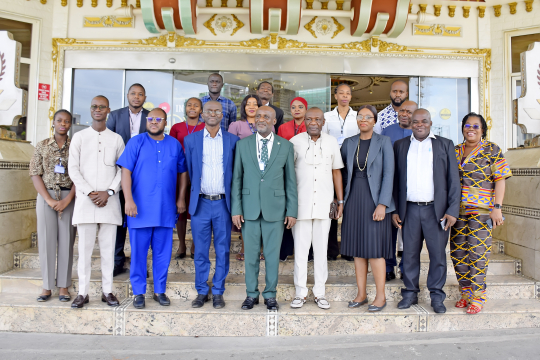EfD Nigeria is partnering with the National Climate Change Council (NCCC) to develop a framework for the implementation of carbon tax in Nigeria in line with the provisions of the country’s Climate Change Act. NCCC is a government agency responsible for the implementation of Nigeria’s Climate Change Act.
To advance the collaboration, a technical workshop was jointly organized by EfD Nigeria and EfD Ghana in Nigeria on July 4, 2024. The workshop aimed to explore the opportunities and challenges of implementing carbon taxes and removing fuel subsidies not only in Nigeria but also across other African nations.
It brought together key stakeholders from Nigeria's Ministry of Budget Planning, academia, Federal Ministry of Environment, private sector entities, civil society organizations, and representatives from the Government of Ghana
Carbon Tax implementation to come in phases
Professor Nnaemeka Chukwuone, Director of EfD Nigeria, emphasized that the workshop’s objective was to disseminate findings from a joint study conducted by EfD Nigeria and EfD Ghana. The study gathered stakeholder perspectives on the removal of fuel subsidies and the introduction of carbon taxes in Nigeria.
The research highlighted that simultaneous implementation of production and consumption carbon taxes could significantly impact Nigeria’s GDP and household incomes negatively.
Nnaemeka Chukwuone suggested prioritizing consumption carbon taxes initially, with production taxes potentially phased in gradually to mitigate economic impacts
Government interested in the framework
Dr. Moses Ama, representing the Nigerian government, affirmed the government's readiness to support the development of an effective carbon taxation framework.
He underscored the government's commitment to ensuring the initiative’s equitable benefits across all sectors, particularly through strategic investments aimed at mitigating adverse effects on low-income groups.
Professor Daniel Nwachukwu, who represented the Vice-Chancellor of the University of Nigeria, emphasized the importance of practical policy measures such as carbon taxation in reducing greenhouse gas emissions. He pledged the university’s support for EfD Nigeria in advancing the initiative.
Stakeholders support the implementation of carbon tax
Dr. Chizoba Oranu presented findings from the study on stakeholder perspectives, noting widespread agreement among stakeholders on the benefits of implementing carbon taxes to achieve Nigeria's Nationally Determined Contribution (NDC) targets.
However, stakeholders stressed the need for robust public awareness efforts, effective government collaboration with stakeholders, and ensuring that carbon taxes target emitters specifically, rather than applying broadly.
Experiences from Ghana
Rex Asima and Daniel Lamptey, delegates from EfD Ghana, provided insights into stakeholders' perspectives on fuel subsidy implementation in Ghana. They also addressed the challenges and opportunities associated with introducing carbon taxes in Ghana, highlighting parallels and divergences with Nigeria's context.
Mr. Abass Ibrahim Tasunti, representing the Government of Ghana, shared Ghana's experiences with deregulating petroleum prices, shedding light on the lessons learned and future strategies for managing economic and social impacts.
By: Inya Agha Egwu
